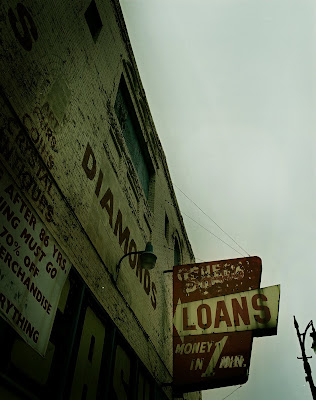As Detroit continues to lose population and taxpayers, Mayor Dave Bing has been struggling to control a budget deficit in the hundreds of millions of dollars. He cut roughly $100 million in spending from his latest budget, but tried to avoid cutting into city services such as grass cutting and street cleaning, which tend to shape people's perceptions of neighborhood quality and safety.
A article in the Wall St. Journal recently profiled some Detroit residents who have taken helping out the city into their own hands. Mowing lawns and clearing weeds, they are trying to help with the upkeep of their neighbourhoods.
Is this just prolonging the inevitable reclamation of urban prairie?
"Mr. Edwards and his neighbors say it has been several years since the city provided many maintenance services on their far East Side block. In the winter, he also pays out of pocket for snow removal for most of his tiny block. Another neighbor has agreed to cover the rest of the block. That keeps residents from being snowed in at home, neighbors say."
Although it's a noble concept and a community rallying point; taking pride in one's surroundings increases the "social investment" of residents. The bigger question is; "is this a precursor to other elements of urban life that will transition from city service to community driven?
How far off would volunteer fire services be?
With the intended contraction of the city and the redeployment of neighbourhoods, the complexion of the city will take on a more rural feel and just like in rural areas, services and communities tend to become more insular and services become more inverted. What is next for Detroit?
Sunday, July 11, 2010
Sunday, July 4, 2010
10 HOUSES A DAY
Detroit is finding it easier to tear down homes than to make property owners pay for the demolition.
The city has sent invoices totaling more than $2.2 million to owners of abandoned homes razed as part of Mayor Dave Bing's massive demolition project.
The total collected so far: $13,024.
The plans is to tear down 10,000 homes over 3 years, adding another 10,000 vacant lots to the city total. This is an ambitious project that amounts to 10 houses a day, 365 days a year for 3 years. Some of the money earmarked for this has come from Federal incentives and this money runs out this year. So, who ends paying for this when it's obvious that many of the property owners have no money, are no longer in the area or the paperwork is long gone? Many of the homes already torn down have been abandoned for many years and former owners are long gone.
"With less than half the population of its peak in 1950, Detroit neighborhoods are pockmarked by empty homes. Vacant buildings often pose a danger to neighborhood children, are used as drug houses and drive down property values. "
“Things that were unthinkable are now becoming thinkable,” said James W. Hughes, dean of the School of Planning and Public Policy at Rutgers University, who is among the urban experts watching the experiment with interest. “There is now a realization that past glories are never going to be recaptured. Some people probably don’t accept that, but that is reality"
Thursday, July 1, 2010
RUIN PORN
Detroit has an interesting image predicament. The majority of media coverage on Detroit's "situation" tends to focus on the obvious urban decay and blight. Especially for foreign audiences, seeing images of this once great city, long a model for American might and power, and now festering with abandonment, is an irresistible draw. People are voyeurs and the images of destruction and discard provoke amazement.
Detroiters often complain that the way their city is portrayed is often through a narrow scope and does not tell the entire picture. This begs the question would Detroiters feel the same sense of surprise and amazement visiting other cities as people visiting Detroit feel for the first time? In other words, do people living in Detroit realize that things are so remarkably stark and different and would then understand the fascination with the level of decay in their city?
In an article in Vice magazine a local Detroit photographer and writer James explains the barrage of inquires he receives from press wanting to cover the decline of Detroit: “At first, you’re really flattered by it, like, ‘Whoa, these professional guys are interested in what I have to say and show them.’ But you get worn down trying to show them all the different sides of the city, then watching them go back and write the same story as everyone else. The photographers are the worst. Basically the only thing they’re interested in shooting is ruin porn.”
Here is an article in the Detroit Free Press that expands on this: RUIN PORN
Subscribe to:
Comments (Atom)






